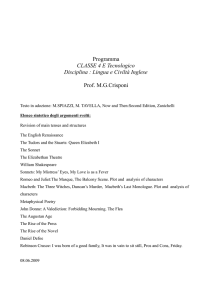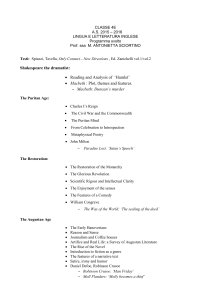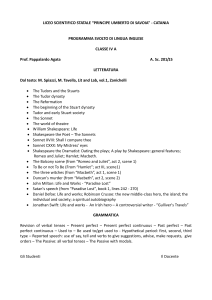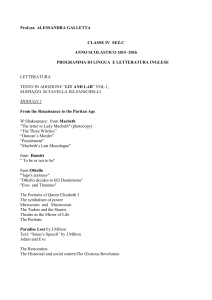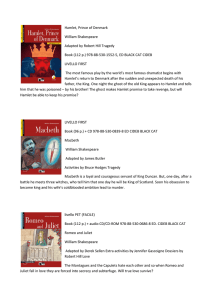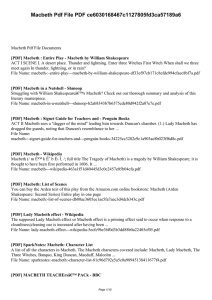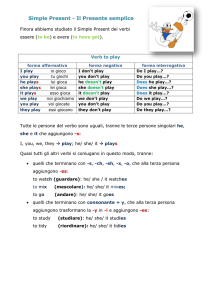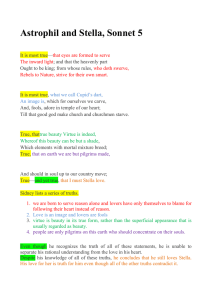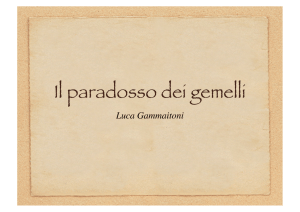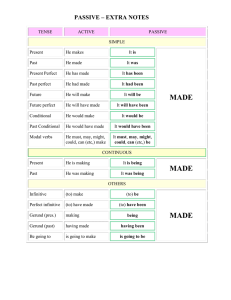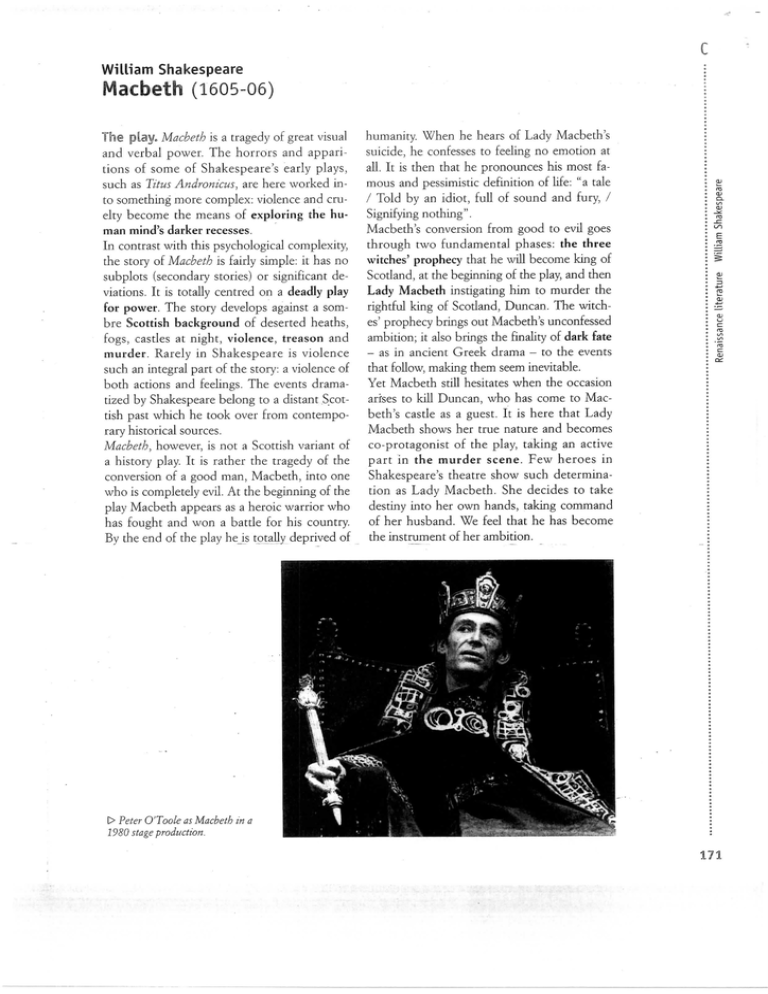
William Shakespeare
Macbeth (1605-06)
The play. Macbeth is a tragedy of great visual
and verbal power. The horrors and apparitions of some of Shakespeare's early plays,
such as Titus Andronicus, are bere worked into somediing more complex; violence and cruelty become die means of exploring the human mind's daiker recesses.
In contrastwith this psychological complexity,
the story of Macbeth is fairly simple: it has no
subplots (secondary stones) or significant deviations. I t is totally centred on a deadly play
for power. The story develops against a sombre Scottish background of deserted heaths,
fogs, casdes at night, violence, treason and
murder. Rarely in Shakespeare is violence
such an integrai part of the story; a violence of
both acdons and feelings. The events dramatized by Shakespeare belong to a distant Scottish past which he took over from contemporary historical sources.
Macbeth, however, is not a Scotdsh variant of
a history play. It is rather the tragedy of the
conversion of a good man, Macbeth, into one
who is completely evil. At the beginning of the
play Macbeth appears as a heroic warrior who
has fought and won a batde for bis country.
By the end of the play hejs totally deprived of
O Peter O'Toole as Macbeth in a
1980 stage production.
huraanity When he hears of Lady Macbeth's
suicide, he confesses to feeling no emotion at
ali. I t is then that he pronounces his most famous and pessimiste definition of Life; "a tale
/ Told by an idiot, full of sound and fury, /
Signifying nothing".
Macbeth's conversion from good to evil goes
through two fundamental phases: the three
witches' prophecy that he wHl become king of
Scodand, at the beginning of the play, and then
Lady Macbeth instigating him to murder the
rightful king of Scotland, Duncan. The witches' prophecy brings out Macbeth's unconfessed
arabitìon; it also brings the finality of dark fate
- as in ancient Greek drama - to the events
that follow, making them seem inevitable.
Yet Macbeth stili hesitates when the occasion
arises to kiil Duncan, who has come to Macbeth's casde as a guest. It is bere that Lady
Macbeth shows her true nature and becomes
co-protagonist of the play, taking an active
part in the murder scene. Few heroes in
Shakespeare's theatre show such determination as Lady A4acbeth. She decides to take
destiny into her own hands, taking command
of her husband. We feel that he has become
the instrument of her ambidon.
When the play opens, Macbeth and Banquo, two generals of Duncan, the king of Scodand,
meet three witches who prophesy that Macbeth shall be king and that Banquo shall beget
kings. This fires Macbeth's ambition. On the instigation of Lady Macbeth, when king
Duncan comes to Macbeth's casde for the night he murders him as he sleeps.
After the murder the king's sons manage to escape and Macbeth assumes the crown. To
defeat the prophecy of the witches, Macbeth also contrives the murder of Banquo. From this
moment of apparent triumph the tragedy of Macbeth precipitates. Ghosts haunt him and he
is driven to a series of murders. Lady Macbeth, tortured by guilt, kills herself
Civil w a r breaks o u t and Macbeth is slain by Macduff, a friend o f t h e m u r d e r e d Duncan.
Malcom, Duncan's son, is made king of Scotland.
o
Revising
1
What is ttie main theme of Macbethl
2
Where is the story set?
William
Macbeth (1605-06)
Define the character of Macbeth.
4
What is Lady Macbeth's rote?
5
What inflames his ambitìon?
Maclbeth Shdl Sleep N o Moire
(pig)
Shakespeare,
3
Ihis passage is taken from Act lì, Sceoe IL The scene takes place In Macbeth's castle, Macand his wife have pLaiirted io idll, the Idiig. The driving force behincì this jslao is ctearly
P.ady Macbeth. it is siie who pushes her husband towards murder, overcomifig his irdtiol
doubts and tiesitations, aiid serids Mm to tiie idinj's room to coramit raurder. Heire slie is a-
Ione 00 the stage; waiting for her hasband to come back.
Pre-reading
Read the title given'to the excerpt: what may be the reason for Macbeth's sLeepLessness?
c It is not the right time to sleep.
He is very happy and toc excited.
d
He has just woken from a nightmare.
b He is overcome by remorse and fear.
a
^
[Enter MACBETH, can-ying two blood-stained daggers']
[Entra HACBfru, portando due puanoli macchiati di sangue]
IVIACBETH
I have done the deed. Didst t h o u n o t b e a r a noise?
L A D Y I h e a r d t h e owl-scream a n d t h e cricket's cry.
D i d n o t you speak?
iMACBETT-1
LADY
Non hai parlato?
MACH. Quando?
LADY MACB. Ora.
New.
MACBETH
Asidescended?
MACB. Mentre scendevo?
LADYÀy
'
LADY MACB. Sì.
iMACBEJH
5
•• '
LADY
LADY
•
'
Hark!
This is a s o r r y sight.
A foolish thought, to say a sorry sight.
MACBETH
LADY MACB. Donalbain.
MACB. È una vista pietosa.
LADY MACB. Sciocco pensiero dire: una vista pietosa.
MACB. Ce n'era uno che rideva nel sonno, u i altro
There's one did laugh in's sleep, and one cried "Murder!"
che g r i d ò : "Assassìnio!",
That t h e y did wake each other. I stood and heard t h e m .
sì che si svegharono l'un l'altro. Mi fermai per sentirli
But they did say their prayers and addressed them
ma dissero le preghiere e ripresero a dormire.
Again t o sleep.-
172
HACB. Ascolta! Chi dorme nell'altra camera?
, : W h o lies i ' t h e second chamber?
Donalbain.
MACB"ETH
10
LADY HACB. Ho sentito gridare la civetta, e cantare il grillo.
. . . .•
When?
., _
MACB. L'ho fatto. Non hai sentito un rumore?
LAD\
There are two lodged together.
i ADY [viACB. Due Q Q r n i o n o insieme.
Uno g r i d ò , "Dio ci benedica!" e i'aitro "Amen",
One cried "God bless-us" and "Amen" the otlier,
As they had seen me with these hangman's hands.
Listening their fear I could not say "Amen"
coinè se ini avessero visto con queste mani di carnefice.
When they did say "God bless us".
quando dissero "Dio ci benedica".
My\CBET]i
15
LADY
Consider it not so deeply
LADY HACB. NoH rifletterci troppo.
But wherefore could not I pronounce "Amen"?
I had most need o f blessing, and "Amen"
Stuck in my throat.
20 LADY
•
These deeds must not be thought
MACBETH
After these ways; so, it wiil make us mad.
iViACBETlT
Methought I heard a voice cry, "Sleep no more!
Macbeth does murder sleep" - the innocent sleep,
Sleep that knits up the ravelled sleave of care,
25
The death of each day's life, sore labour's bath,
Balm of hurt minds, great nature's second course,
Chief noLtrisher i n life's feast.
LADY
What do you mean?
Stili it cried "Sleep no more" to-all the house;
"Glamis hath murdered sleep, and therefore Cawdor
.30
Shall sleep no more, Macbeth shall sleep no more."
LADY Who was it that thus cried? Why, worthy thane,
You do unbend your noble strength, to think
So brain-sickly of things. Go, get some water,
And wash this filthy witness from your band.
35
W h y did you bring these daggers from the place?
They must lie there. Go, carry them and smear
The sieepy grooms with blood.
MACBETH
TU go no more.
.
MACBETH
40
HAC8, f'ia p e r c h é non ! i o potuto dire " A m e n " ?
Avevo più che mai bisogno d'una benedizione e r"Arnen"
mi rimase sulla lingua.
LADY KAce. A questi fatti non si deve pensare in q u e s t o m o d o
che altrimenti ci faranno impazzire.
m&. Mi parve di udire una voce gridare, "Non dormire p i ù ! "
"Macbeth assassina il Sonno" - il Sonno innocente,
ì i Sonno che ravvia la matassa scompighata dell'affanno,
morte della vita d'ogni giorno, bagno della dura fatica,
balsamo delle a n i m e ferite, seconda portata della grande
Natura primo nutrimento net banchetto della vita.
LADY MACB. Che VUOI dire?
HACB. E seguitava a gridare, "Non dormire più!" a tutta la casa
"Glamis ha assassinato il Sonno, e perciò Cawdor
non d o r m i r à più, Macbeth non d o r m i r à più!"
LADY r.ìACB. Ma chi era che gridava cosi? Degno baione,
sprechi la tua nobile forza net pensare
atte cose tanto morbosamente. Va' a prendere dell'acqua
e lava dalla mano questa sozza testimonianza.
Perctié hai riportato qui i pugnah?
Debbono restare h : va', rimettiti a posto
e imbratta di sangue te guardie addormentate.
HACB.
fvon ci a n d r ò più.
Ho paura al pensiero di ciò che ho fatto:
I am afraid to think what I have done;
" L a o k o n ' t again I dare not.
LADY
Di fronte al loro timore, non ijocei dire "Amen"
non oso guardarlo un'altra volta.
LADY MACB. Sei troppo fragile.
I n f i i m of purpose!
Give me the daggers. The sleeping and the dead
Are but as pictures. 'Tis the eye of childhood
That fears a painted devil. I f he do bleed,
ni gild the faces of the grooms withal,
For it must seem their guilt.
\Exit. Knock wìthin\
MACBETH
Whence is that knocking?
45
How is't with me when every noise appals me?
What hands are bere! Ha - they pluck out mine eyes!
WiU ali great Neptune's ocean wash this blood
Clean from my band? No, this my band will rather
The multitudinous seas incarnadine,
50
Making the green one red.
{Enter L A D Y M A C B E T H ]
LADY My hands are of your colour; but I shàme
To wear a heart so white.
Dammi i pugnah. I dormienti e i morti
non sono che immagini; è l'occhio del fanciullo
ad aver timore d'un diavolo dipinto.
Se lui sanguina, colorirò il viso delle guardie:
deve sembrare colpa loro.
[tsce. Bussano fuoii
HACE.
scena]
Chi è che bussa'
Com'è c h e ogni r u m o r e mi atterrisce?
Che mani sono queste? Ah! Mi strappano gli occhi.
Basterà tufco it grande oceano di Nettuno
a lavare questo sangue dalla mia mano? No, questa mia mano
piuttosto i m p o r p o r e r à mari innumerevoh
facendo del verde un solo rosso.
[Entra
LADY HACBETHJ
LADY MACBETH
Le mie mani hanno lo stesso colore ma io
mi vergognerei di avere un cuore così bianco.
\Knock\
[Bussano]
I heai: a knocking
At the soiJth entry. Eetire we to our chamber.
A httle water clears us of this deed;
How easy is i t then! Your constancy
Hath left you unattended.
55
Sento bussare al portone a Sud
Ritiriamoci netta nostra camera.
Un po' d'acqua ci puriiaclierà di questo atto
.com'è facile, dunque!
La tua fermezza ti ha abbandonato.
[Knock^
Hark! more knocking.
Get on your nightgown, lest occasion calJ us
And show us to be watchers. Be not lost
So poorly in your thoughts.
MACBETH
To know my deed 'lAx^ere best not know myself.
60
[Knock]
Wake Duncan with thy knocking! I w o u l d thou couldst!
[Exeunt]
[Bussano]
Ascolta! Altri colpi. Indossa la vestaglia,
a f f i n c h é non si scopra che siamo ancora alzati.
Non perderti così miseramente nei tuoi pensieri.
.CB. Se debbo conoscere it mio atto, sarebbe megho
non conoscere me stesso.
[Bussano]
Svegha Duncan coi tuoi colpi: vorrei che lo potessi!
[Escono]
(translated by Agostino Lombardo)
O
Macbeth
sees the ghost
of Banquo,
Charles
in a-
Kean
production,
the
at
Princess's
iheatre,
London,
1853.
Charles, son of
the great
Romantic
Edmund
actor
Kean,
prwui
spectacular
staging
rather
than ftdelity
the
to
text
Focus ori the text
The scene opens with the powerfu] sight of Macbeth carrying two blood-stained daggers with which
he has just killed King Duncan. As often in Shakespeare the visual image on the stage - the action is doubled by the verbal images used by the speakers: blood is the obsession of IVJacbeth's speeches
in this scene.
Throughout the passage Shakespeare contrasts JMacbeth's fears with his wife's determination.
Macbeth is so shaken by the murder he has committed that he becomes incoherent in his speech and
begins to have visions: he cannot say "Amen" since this sacred word from Christian liturgy "stuck in
my throat". (1. 19); he hears a voice cry: "Sleep no more! / Macbeth does murder sleep" (11. 22-23), he
sees hands that try to pluck out his eyes (1. 46). He fears the blood on his hands will never be washed
away; it is more likely that his hands will make the sea red (11. 48-50). To this hyperbole (exaggerated
image) Lady Macbeth opposes ber disdainful words: "My hands are of your colour; but I shame / To
wear a heart so white" (11. 51-52), and her cool common sense: "A litde water clears us of this deed"
(1. 54). She is fiercely determined. It is she who goes back to the dead king's chamber co take back the
blood-stained daggers and, when the knocking on the door begins, tells her husband to put on his
nightgown and.pretend he was sleeping. She .is not such a one-sided character, however, as never to
hesitate. In the first exchanges of the passage, after the murder has been committed, she and
Macbeth pronounce short, quick sentences - as guiky people do when they fear they might be
caught. The scene ends with another great stroke of psychological realism: in the middle of
Macbeth's raving a knock on the door is suddenly heard. The knock is repeated. With this simple act
life takes on its course again after the murder.
While-readiny
c.
Focus on Macbelli ( l ì n e s i - 4 4 ) .
What deed has Macbeth just committed?
Macbeth is shaken by the murder he has just committed. What languistic device is used to express his state of mind?
Give evidence of his state of mind.
Focus on Lady Macbeth (lines 1--44).
Macbeth's fear is contrasted by Lady Macbeth's firmness.
What does she suggest that he do?
What shows her fierce determination?
Focus on the hands.
Macbeth is obsessed by his hands: list ali
the expressions or images related to them.
Focus on Macbeth ami Lach/ Macbeth
(lines 4 4 - 6 1 ) „
a. Again fear and horror overcome Macbeth;
what image is used to descnbe his feelings?
b. Lady Macbeth's words stress the difference
between she and her husband; express in
your own words what she says.
c. How do the couple react to the knocking
on the doór?
iil.i!ììograpii'ìy
Macbeth directed by Roman Polanski, starring J. Finch - F. Annis - M . Shaw - N . Selby,
UK 1971.
Surnrnarizìng
:'• l'ili in the btanlis. You wil.i. get a shori:
sommar»/ ot the passage.
blood-stained
put on
act
mind
stabbing
l<nocking speeches
fiercely
Macbeth, who has just come back to his
rooms after
:
King Duncan, is overcome by fear and horror. Incoherent
and visions underLine his state of
Lady
Macbeth, who on the other band is
determined, tries to make him
react but then decides to
in his place and goes to the king's room to
take back the
daggers.
When they hear the
on the door she tells her husband to
'. ,
his nightgown and pretend he was sleeping.
<ì A stili from
Roman
Polanski's film
version of
Macbeth (IJK,
1971).

